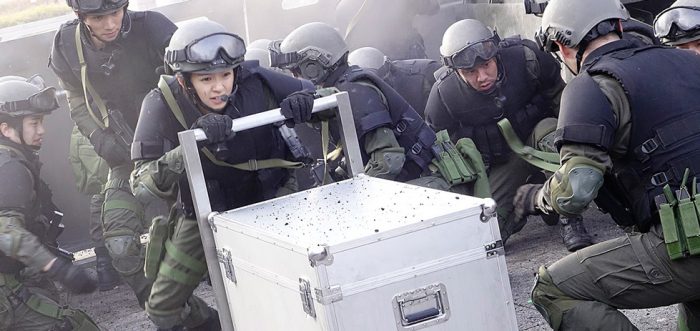
Let’s get the most important concern out of the way: if a title like Library Wars has you dreaming of a comedy that ratchets the mundane perils of the public library system up to a high-stakes action flick, you’re somewhat in luck. The good guys are bubbly librarians turned gun-toting soldiers, the plot basically revolves around a book loan gone rogue, and there’s even an impromptu barricade of desk chairs that looks for all the world like a beat from one of Community‘s paintball episodes. There’s greater aspirations on its mind than sitcom resemblances, though. Set in a near future where Japan has enlisted the unsubtly-named Media Betterment Agency to burn books as a Fahrenheit 451-style show of mass censorship, the Library Defense Force of Kanto rallies to protect both its catalogues and the tenets of free speech they represent, as one of its young and idealistic recruits, Iku Kasahara (Nana Eikura), is strong-armed into pondering its modus operandi, all while secretly pining for the affections of her uptight instructor, Atsushi Dojo (Junichi Okada). The angular turns taking us from the titular war scenes and their lofty questions on warfare morality to moments of romantic-comical character interaction and back again are bearable at first, but in playing out its extended climax, the film drowns its ideological responsibility out with enough gunplay and gravitas to invite the wrong kind of laughter.
It’s understandable that The Last Mission would revel in its resolution when considering that it is the final part in a three-part manga adaptation1, doubly so that screenwriter Akiko Nogi has scripted the whole run, and yet its plot requires remarkably little catch-up, if any. Even a flashback to the moment in the first movie where Kasahara decides to join the Defense Force is rendered unnecessary by an opening scene that sees her breaking from the squad to retrieve a lost bundle of comic books from the firing line. If she’s gladly risking her life to put smiles on children’s faces, then there’s no mistaking where her loyalties lie. On the other hand, the flashback plays into the ongoing love affair with Dojo, which amounts to her openly weeping and putting herself at the risk of dismissal or death on numerous occasions for a man with a comically stiff upper lip. This is too absurdly one-sided to be bought into and yet is fixated upon as a plot thread, especially towards the ending.
More successful drama comes when a devilish lobbyist, Satoshi (Tori Matzusaka), wins the right to implement “Plan Future”, something with an efficiency advantage over the Agency’s current anti-Library tactics that remains unclear even after he makes a slick analogy with wine glasses. In an attempt to yank his idealistic younger brother Hikaru (Sota Fukushi) out of the Library troops to the other side, he has an insider frame Kasahara for book-burning and forces her to swallow the charge lest her beloved Dojo cop the blame. If this sounds like an inexplicable and unfair accusation, it is, with scenes of Kasahura facing off with the board of directors under fluorescent light feeling bereft of decent pacing and coherency. Still, the fraternal stand-off triggering it is one of the few key bits of information that aren’t dumped into a line of dialogue several minutes later than where it might serve the scene, or relegated to a brushed-off sub-plots involving a side character like Kasahura’s gossipy friend (Tao Tsuchiya). Such fleeting pleasures become necessary as the scenes that might capitalise on its unique premise are hurried out the door.
On that same note, director Shinsuke Sato, no stranger to manga adaptations (Sand Chronicles, the Gantz films) shows an eye for comic-panel frames and pacing through aesthetics, which becomes especially noticeable in the climax where the Force holds their ground against a forced reclamation of their sacred text, the Handbook of Library Law. Even when staging intense sniper face-offs in hallways or whirling hand-to-hand combat in back-alleys, he he finds space for moody interludes like where Satoshi coolly cruises through the streets full of indifferent pedestrians. If he only he had the same sensitivity with some of the thematic imagery; a recurring symbol relating to the chamomile flower, hard to grow but resilient once bloomed, gets shopped around in relation to a few different contexts before winding up as a dully obvious descriptor of Kasahara herself. It’s a shame that Nogi and Sato should weigh down the surrounding and striking action sequences with this kind of unearned portent.
All of these jumbled elements would make for a softly-recommended novelty if the dilemmas raised by conflicted heroes – what value is there in free speech when authors censor themselves before the punch, or when the wider public generally doesn’t care? – were addressed in some mature fashion by the end, but no. Best summing it up is a repeated, oddly specific inference of a “twisted” world – a translation quirk, perhaps, or a motif that doesn’t land so squarely on the nose? Nope: instead, the Defence Force’s director hammily speaks of untwisting the world during a lecture in which all the legislative snare-traps laid by our villain are waved away for no reason other than it being time to do so. It’s a metaphor that says more about the filmmakers’ desire for a poetic resolution than anything about the subjects at hand, and Library Wars: The Final Mission suffers for not being able to tell the difference.
